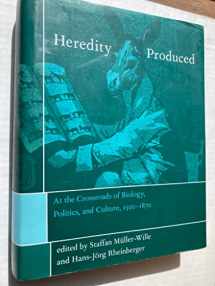
Heredity Produced: At the Crossroads of Biology, Politics, and Culture, 1500-1870 (Transformations: Studies in the History of Science and Technology)
Book details
Summary
Description
The cultural history of heredity: scholars from a range of disciplines discuss the evolution of the concept of heredity, from the Early Modern understanding of the act of "generation" to its later nineteenth-century definition as the transmission of characteristics across generations.
Until the middle of the eighteenth century, the biological makeup of an organism was ascribed to an individual instance of "generation"―involving conception, pregnancy, embryonic development, parturition, lactation, and even astral influences and maternal mood―rather than the biological transmission of traits and characteristics. Discussions of heredity and inheritance took place largely in the legal and political sphere. In Heredity Produced, scholars from a broad range of disciplines explore the development of the concept of heredity from the early modern period to the era of Darwin and Mendel.
The contributors examine the evolution of the concept in disparate cultural realms―including law, medicine, and natural history―and show that it did not coalesce into a more general understanding of heredity until the mid-nineteenth century. They consider inheritance and kinship in a legal context; the classification of certain diseases as hereditary; the study of botany; animal and plant breeding and hybridization for desirable characteristics; theories of generation and evolution; and anthropology and its study of physical differences among humans, particularly skin color. The editors argue that only when people, animals, and plants became more mobile―and were separated from their natural habitats through exploration, colonialism, and other causes―could scientists distinguish between inherited and environmentally induced traits and develop a coherent theory of heredity.
Contributors
David Sabean, Silvia De Renzi, Ulrike Vedder, Carlos López Beltrán, Phillip K. Wilson, Laure Cartron, Staffan Müller-Wille, Marc J. Ratcliff, Roger Wood, Mary Terrall, Peter McLaughlin, François Duchesneau, Ohad Parnes, Renato Mazzolini, Paul White, Nicolas Pethes, Stefan Willer, Helmuth Müller-Sievers


We would LOVE it if you could help us and other readers by reviewing the book
Book review



